8增词法的翻译(教师版)
- 格式:doc
- 大小:58.00 KB
- 文档页数:5

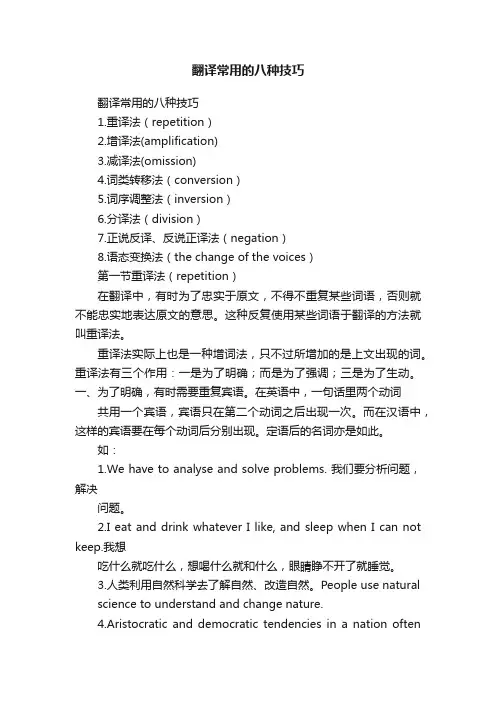
翻译常用的八种技巧翻译常用的八种技巧1.重译法(repetition)2.增译法(amplification)3.减译法(omission)4.词类转移法(conversion)5.词序调整法(inversion)6.分译法(division)7.正说反译、反说正译法(negation)8.语态变换法(the change of the voices)第一节重译法(repetition)在翻译中,有时为了忠实于原文,不得不重复某些词语,否则就不能忠实地表达原文的意思。
这种反复使用某些词语于翻译的方法就叫重译法。
重译法实际上也是一种增词法,只不过所增加的是上文出现的词。
重译法有三个作用:一是为了明确;而是为了强调;三是为了生动。
一、为了明确,有时需要重复宾语。
在英语中,一句话里两个动词共用一个宾语,宾语只在第二个动词之后出现一次。
而在汉语中,这样的宾语要在每个动词后分别出现。
定语后的名词亦是如此。
如:1.We have to analyse and solve problems. 我们要分析问题,解决问题。
2.I eat and drink whatever I like, and sleep when I can not keep.我想吃什么就吃什么,想喝什么就和什么,眼睛睁不开了就睡觉。
3.人类利用自然科学去了解自然、改造自然。
People use naturalscience to understand and change nature.4.Aristocratic and democratic tendencies in a nation oftenshowthemselves in its speech.民族的贵族倾向和民族倾向常在其言语中表现出来。
5.我们来修改安全规则和卫生规则吧。
Let’s revise our safety andsanitary regulations.二、英语常用省略,但为了明确,也为了强调某些内容,在汉语中常常要将省去的部分重译出来。
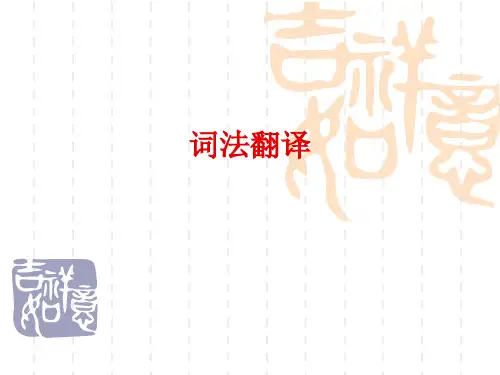
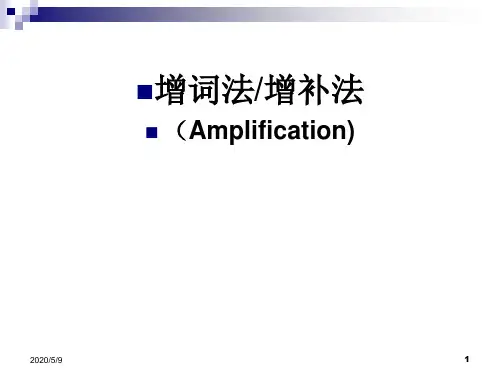
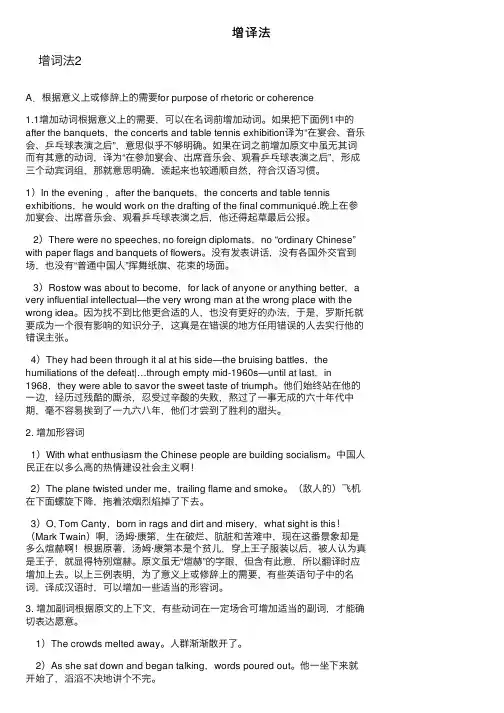
增译法增词法2A.根据意义上或修辞上的需要for purpose of rhetoric or coherence1.1增加动词根据意义上的需要,可以在名词前增加动词。
如果把下⾯例1中的after the banquets,the concerts and table tennis exhibition译为“在宴会、⾳乐会、乒乓球表演之后”,意思似乎不够明确。
如果在词之前增加原⽂中虽⽆其词⽽有其意的动词,译为“在参加宴会、出席⾳乐会、观看乒乓球表演之后”,形成三个动宾词组,那就意思明确,读起来也较通顺⾃然,符合汉语习惯。
1)In the evening ,after the banquets,the concerts and table tennis exhibitions,he would work on the drafting of the final communiqué.晚上在参加宴会、出席⾳乐会、观看乒乓球表演之后,他还得起草最后公报。
2)There were no speeches, no foreign diplomats,no “ordinary Chinese”with paper flags and banquets of flowers。
没有发表讲话,没有各国外交官到场,也没有“普通中国⼈”挥舞纸旗、花束的场⾯。
3)Rostow was about to become,for lack of anyone or anything better,a very influential intellectual—the very wrong man at the wrong place with the wrong idea。
因为找不到⽐他更合适的⼈,也没有更好的办法,于是,罗斯托就要成为⼀个很有影响的知识分⼦,这真是在错误的地⽅任⽤错误的⼈去实⾏他的错误主张。
4)They had been through it al at his side—the bruising battles,the humiliations of the defeat|…through empty mid-1960s—until at last,in 1968,they were able to savor the sweet taste of triumph。
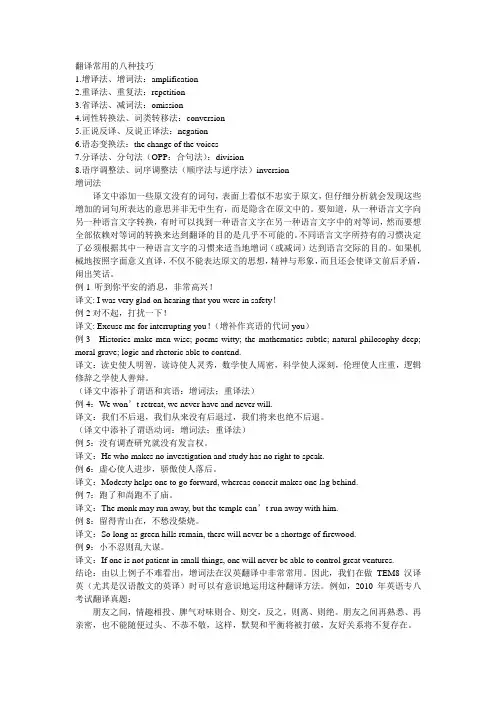
翻译常用的八种技巧1.增译法、增词法:amplification2.重译法、重复法:repetition3.省译法、减词法:omission4.词性转换法、词类转移法:conversion5.正说反译、反说正译法:negation6.语态变换法:the change of the voices7.分译法、分句法(OPP:合句法):division8.语序调整法、词序调整法(顺序法与逆序法)inversion增词法译文中添加一些原文没有的词句,表面上看似不忠实于原文,但仔细分析就会发现这些增加的词句所表达的意思并非无中生有,而是隐含在原文中的。
要知道,从一种语言文字向另一种语言文字转换,有时可以找到一种语言文字在另一种语言文字中的对等词,然而要想全部依赖对等词的转换来达到翻译的目的是几乎不可能的。
不同语言文字所持有的习惯决定了必须根据其中一种语言文字的习惯来适当地增词(或减词)达到语言交际的目的。
如果机械地按照字面意义直译,不仅不能表达原文的思想,精神与形象,而且还会使译文前后矛盾,闹出笑话。
例1 听到你平安的消息,非常高兴!译文: I was very glad on hearing that you were in safety!例2对不起,打扰一下!译文: Excuse me for interrupting you!(增补作宾语的代词you)例3 Histories make men wise; poems witty; the mathematics subtle; natural philosophy deep; moral grave; logic and rhetoric able to contend.译文:读史使人明智,读诗使人灵秀,数学使人周密,科学使人深刻,伦理使人庄重,逻辑修辞之学使人善辩。
(译文中添补了谓语和宾语:增词法;重译法)例4:We won’t retreat, we never have and never will.译文:我们不后退,我们从来没有后退过,我们将来也绝不后退。
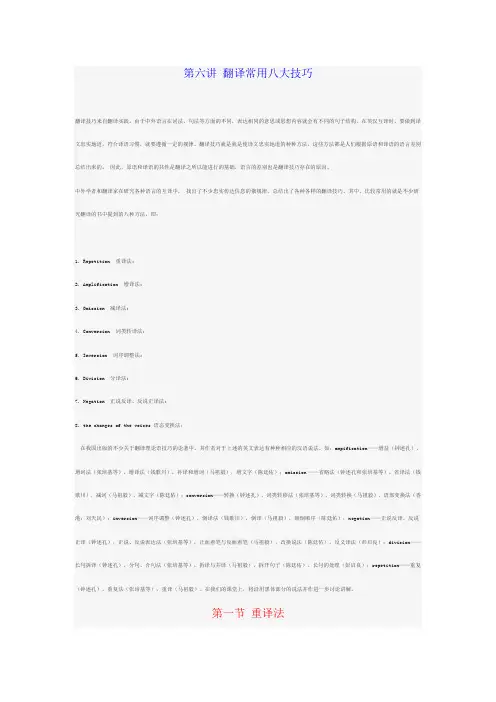
第六讲翻译常用八大技巧翻译技巧来自翻译实践。
由于中外语言在词法、句法等方面的不同,表达相同的意思或思想内容就会有不同的句子结构。
在英汉互译时,要做到译文忠实地道,符合译语习惯,就要遵循一定的规律。
翻译技巧就是就是使译文忠实地道的种种方法,这些方法都是人们根据原语和译语的语言差别总结出来的。
因此,原语和译语的共性是翻译之所以能进行的基础,语言的差别也是翻译技巧存在的原因。
中外学者和翻译家在研究各种语言的互译中,找出了不少忠实传达信息的俄规律,总结出了各种各样的翻译技巧。
其中,比较常用的就是不少研究翻译的书中提到的八种方法,即:1. Repetition 重译法;2. Amplification 增译法;3. Omission 减译法;4. Conversion 词类转译法;5. Inversion 词序调整法;6. Division 分译法;7. Negation 正说反译、反说正译法;8. the changes of the voices 语态变换法;在我国出版的不少关于翻译理论语技巧的论著中,其作者对于上述的英文表达有种种相应的汉语说法。
如:ampification——增益(钟述孔),增词法(张培基等),增译法(钱歌川),补译和增词(马祖毅),增文字(陈廷佑);omission ——省略法(钟述孔和张培基等),省译法(钱歌川),减词(马祖毅),减文字(陈廷佑);conversion——转换(钟述孔),词类转移法(张培基等),词类转换(马祖毅),语部变换法(香港:刘天民);inversion——词序调整(钟述孔),倒译法(钱歌川),倒译(马祖毅),颠倒顺序(陈廷佑);negation——正说反译、反说正译(钟述孔),正说、反说表达法(张培基等),正面着笔与反面着笔(马祖毅),改换说法(陈廷佑),反义译法(彭启良);division——长句拆译(钟述孔),分句、合句法(张培基等),拆译与并译(马祖毅),拆开句子(陈廷佑),长句的处理(彭启良);repetition——重复(钟述孔),重复法(张培基等),重译(马祖毅)。
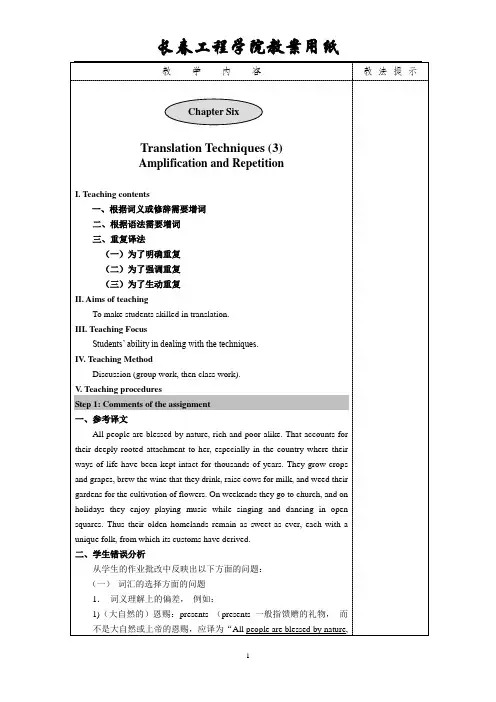
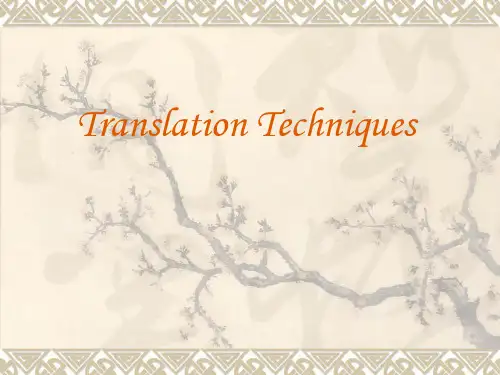
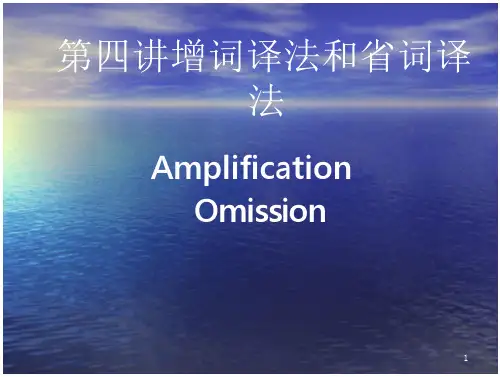
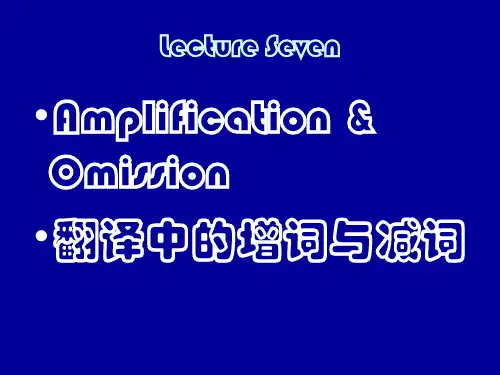
Translation Exercises:(增词法)1。
Nuclear radiation has a certain mystery about it, partly because it cannot be detected by human senses。
核辐射这种现象多少有点神秘,其部分原因是人类器官无法觉察到它的存在。
2. Some motions appear to be very simple; others very complicated。
有些运动看起来很简单,有些运动看起来则很复杂。
3. Which do you like better: grammar or translation exercises?你喜欢语法练习,还是翻译练习?4。
They include silks and colored thread.它们包括各种丝绸和彩线。
5。
In spite of difficulties, he succeeded in finishing his task。
尽管困难重重,他成功地完成了任务.6。
The middle-aged teacher carried on teaching work in spite of the diseases。
尽管那位中年教师身患种种疾病,他仍坚持进行教学工作。
7. In America, motorcar factories were closing down in early 1961。
1961年初,美国的汽车工厂纷纷倒闭。
8。
Day after day he came to his work---sweeping, scrubbing, cleaning。
他每天来干活——-扫地,擦地板,收拾房间.9。
I could knit when I was seven。
我七岁时就会织毛衣。
10。
Her bravery surprised all。
小议汉译英中的增词法汉译英之增词在汉译英的过程中,有时为了使译文清楚明了,须加词或减词;有时还需要改变原文的词面意义,采用别的说法才能符合译入语的习惯用法。
为了使译文忠实地表达原文的含意,并让译文符合译入语的习惯表达法,在翻译时我们必须增补或减少一些词语。
所谓增词,不单是说译文比原文多了几个词,而主要是指用增加词来补充或阐明原文的意思或满足英语本身的需要而言。
增词一般是根据以下两种需要进行。
一、由于英语结构和上下文的需要(一)增补代词或名词由于汉语里无主语句较多,译成英语时就必须补足主语。
例如:1.从他的演说中,可以看出,他赞成什么,反对什么;喜欢什么,痛恨什么。
People might see from his speech what he is for and what he is against,what he likes and what he bitterly hates.(如不加用“people”一词就不符合英语的习惯用法)2.不少大学毕业生响应政府的号召到西藏和边疆地区参加工作。
Quite a number of college graduates responded to the call of our government to work in Tibet and some frontier areas.3.美国的中小学生每天上学都要带上午餐盒。
The American elementary and secondary school children take their lunch boxes to school every day.4.请原谅,打断一下你们热烈的讨论。
Excuse me for my interruption of your heated discussion.在2、3两例的英译文中所增补的物主代词our、their和例4中增补的宾语me是汉语中没有的,而在英语里则必不可少。
英汉翻译常用技巧----增词法Oct. 24th–28th 增词法是指在原文的基础上添加必要的单词,词组,分句或完整句,从而使译文在语法,形式上都符合汉语的习惯并使译文在文化背景,词语联想方面与原文保持一致,以达到疑问与原文在内容,形式和精神方面对等起来的目的。
Practices first:1.In the evening, after the banquets, the concerts and the table tennis exhibitions, he would workon the daily summary over some coffee. 晚上在参加宴会,出席音乐会,观看乒乓球表演后,他还会边喝咖啡边写每日小结。
2.With what enthusiasm members of Communist Party of China are conducting political studies.中国共产党员正以多么高的热情进行政治学习啊!3.In the films of those days, all too often it was the same scenario: the hero meets the heroine,they fall in love and live happily ever after. 那时的电影总是一样的剧情:男主人公与女主人公相遇,继而相爱,从此过上幸福的生活。
4.Don’t take it seriously. I am just making fun of you. 不要认真嘛!我不过是开开玩笑而已。
5.Once, they had a quarrel over the question of whom to turn off the TV. 他们曾经为了谁去关电视的问题吵了一架。
I.Semantic amplification由于中英文语言差异,翻译时常常要根据意义的需要,在相关词汇后加上适当的词,使直通顺自然,符合中文表达习惯。
增加名词:在汉语中,及物和不及物动词的区别不是很明显,有时所谓及物动词后面的宾语如果上下文中能够看的出,往往可以省略不说;而英语则不然。
特别是一些不及物动词必须带上它后面的宾语句子意思才能显得完整。
因此,在翻译时往往就需要增补。
a. Make a schedule or chart of you time and fill in committed time such as eating, playing, meetings, classes, etc. 作一个时间表,然后,将吃饭、睡觉、开会、上课等等的时间填上。
b. I came here in the spirit of friendship and learning. 我是为友谊和求学而来。
有时形容词前面也可以加上名词:c. His wife thinks that this furniture is too expensive and, moreover looks very ugly. 他妻子认为,这件家具价格昂贵而且外表难看。
有时,一些名词或者数量词的复数形式翻译成汉语后前面也要加词表示重叠:d. Thousands of students from the city’s colleges and universities jammed the railway station awaiting the arrival of their football team. 成千上万的高校学生一起涌到火车站欢迎他们的足球队凯旋。
e. To look after the hordes of sick men there were only a few old doctors who were helpless before such scene of suffering and misery. 只有这些老医生来照看一群群的伤员,他们在如此的痛苦、悲伤面前,显得无可奈何。
1.This is a Ford. 这是一辆福特牌汽车。
2.This new brand of PC is cheap and fine. 这个新牌子的电脑物美价廉。
3.We can learn what we did not know before. 我们能学会以前不懂的东西。
增加动词由于英语是一门“静止”的语言,在所有的词汇当中,用名词的居多;而相比较而言,汉语则无此限制,不管有多少动词都可以并排使用。
因此,许多英语的名词翻译成汉语时都要加上一些动词,否则,意思则很不完整,例如:a. His speech in at the meeting turned out exerts a stimulating effect on the mind of the people present that day. 他那天在会上所做的报告使所有在场的人深受鼓舞。
b. He maintains that only hard work and unswerving perseverance can lead to improved performance. 他坚持认为,只有通过勤奋工作加上不懈的努力才会取得好的成绩。
c. The lives claimed by shoddy construction projects should be enough to put governments at all levels on the alert. 伪劣建筑夺取了很多人的生命,这一点足以使我们的各级部门提高警惕。
d. Efforts must be made to improve service for more than 1 million domestic and overseas tourists.为了一百万的国内外旅客的利益,我们一定为改善服务质量而进行努力。
英语中的某些不及物动词实际隐含有宾语的意思,翻译时应补充其宾语:4.Mary washed for a living after her husband died. 自从她丈夫去世后,玛丽靠给人洗衣服维持生计。
5.Day after day, she did the same thing---sweeping, washing and cleaning. 日复一日,她做着同样的事情:拖地,洗衣服,整理房间。
增加表示程度等的副词:a.They started up into the sky until the noise of the rocket died away.他猛地抬头往天空看,直到火箭发射的声音渐渐远去。
b. He stole a glance at the pretty girl walking alongside with him.他偷偷地瞥了她一眼。
6.She poured out her story of misfortune. 她滔滔不绝地倾诉了她的不幸遭遇。
7.Time drops in decay, like a candle burnt out. 时间一点一滴的逝去,犹如蜡烛慢慢燃尽。
根据隐含的意义补充形容词等:8.Facts are to scientist as words are to the poets. 事实对于科学家正如文字于诗人一样重要。
增加表示总结或概括的词语:9.Henry Kissinger had slept in the hotel before in July and then in October. 基辛格分别于7月和十月两度下榻于该酒店。
10.The advantages of the hall are bright, spacious, fashionable and without echo. 这个大厅有四大优点:明亮,宽敞,样式新颖,没有回音。
11.They talked about wage, price and inflation. 他们谈及工资,物价和通货膨胀等问题。
英语词态及曲折变化词体现在动词上,汉译时应增加一些表示时间,状态等助词:如“曾经”“已经”“过/了”表示过去,“正在”“着”“现在”等表示现在进行,“将”“会”“要”等表示将来,以及其他一些词“过去”“现在”“将来”等。
12.I was, and remain grateful for his influence on my life. 他在我生命中有着重要的影响,对此,我过去很感激,现在依然很感激。
13.China has been implementing the birth control policy over the past decades. 过去几十年来,中国一直在推行计划生育政策。
英语中介词,副词,形容词甚至连词等都可以表达动作含义,亦可通过助动词等省略作谓语的动词,翻译时应补充合适的动词:14.They quarreled for about 10 hours, through dinner, and deep into the night. 他们吵了大约10小时,中间吃了顿晚饭又接着吵到深夜。
15.He dismissed the meeting without a closing speech. 他没有致闭幕辞就宣布会议结束。
16.We don’t retreat; we never have and never will. 我们决不后退,我们从来没有后退过,将来也决不后退。
英语中数词与可数名词往往直接连用,但翻译时应加上适当的量词:17.Flowers bloom all over the garden. 朵朵鲜花在花园里处处开放。
18.The first electronic computers came into use in 1950s. 第一代电子计算机在二十世纪五十年代正式投入使用。
19.A red sun rose slowly from the calm sea. 一轮红日从平静的海面冉冉升起。
20.Repeat the experiment using a wooden ruler, a piece of glass, a coin, a piece of paper, and apin. 用一把木尺,一块玻璃,一枚硬币,一张纸和一个大头针,重做这个实验。
某些由动词或形容词派生出来的抽象名词,翻译时可根据上下文增加名词,使译文更符合汉语规范:如preparation(准备工作),madness(疯狂行为),tension (紧张局势)等:21.We have made some achievements, and we must guard against complacency. 我们取得了一些成绩,但还要防止自满情绪。